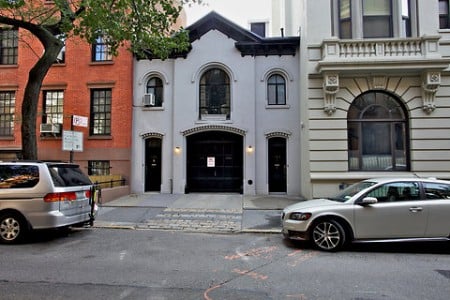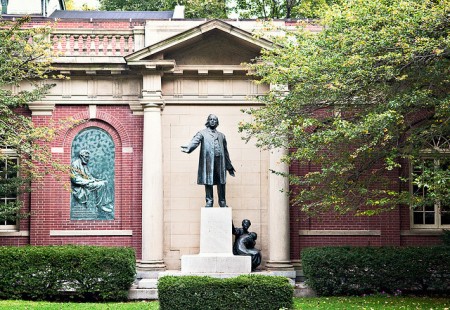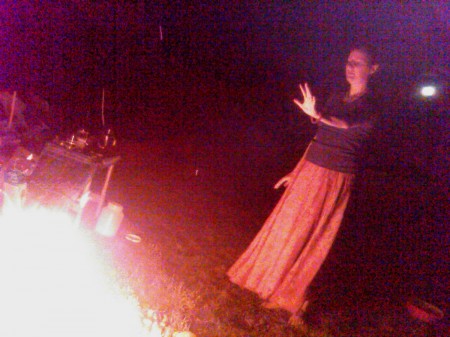
Amanda and I took the day off today from church in order to get a head start on Halloween decorating. Which means that I ducked into our home office to escape the chaos of three kids unpacking styrofoam spiders to, uh, touch bases with my favorite readers of irreverent religious crapola. Thanks for being here for me. Really.
Maybe it’s because fall is here and there’s nothing in the world quite like autumn in New York, but here’s what’s on my mind. The Jehovah’s Witnesses, whose headquarters have dominated the landscape of New York’s fabled Brooklyn Heights neighborhood for over a century, just put a bloc of historic properties up for sale. The religion plans to eventually move its headquarters to upsate New York.
According to an article in the New York Times, the sale includes three multi-family buildings (total asking price: $18.45 million) a carriage house built in the late 1800s ($4.5 million) and several historic brownstones. In terms of square footage, these represent just a drop in the bucket of the Society’s holdings in the Heights, yet they are highly desirable. If I had the money, I’d snap one up myself.
Ah, ch-ch-ch-changes! So many mixed feelings, so little belief in a hereafter.
As a former Jehovah’s Witness and member of its Brooklyn “Bethel Family” back in the 1980s, I have many fond memories of my time there. It was then that I fell in love with Brooklyn Heights and New York City in general. The neighborhood positively reeks of U.S. history and literary ferment. Poets and writers such as W. H. Auden, Truman Capote, Norman Mailer, Philip Levine, Carson McCullers, Walt Whitman and Thomas Wolfe once walked or stumbled home drunk on the very same stone-paved sidewalks that I sprinted down, late, to attend Morning Worship or to grab a slice of pizza at Fascati’s.
Back in the day, the neighborhood was also on the forefront of religious progressivism. At the turn of the last century, Watchtower founder Charles Taze Russell was attracted to the area in part so that he could live and work across the street from Congregational preacher and anti-slavery advocate Henry Ward Beecher.

Not surprisngly, the neighborhood became a mecca for Jehovah’s Witnesses from all over the world. After saving, sometimes for years, a portion of their usually meager income (since they oppose higher eduction, Witnesses tend to be less educated and therefore less affluent), thousands of worshipers make a pilgrimage to Brooklyn headquarters each year. One of my assignments involved touring them through the printing facilities and hosting them on excursions into the City. To them, I was a big fish in the biggest pond in the world.
That milieu and much-needed praise helped me to snap a chalkline across the diameter of my own thoughts, blessing (or cursing) me with the belief that there was nothing that I couldn’t accomplish. I wasn’t alone in that. Many Bethel members came from poorly educated families in rural areas that offered few opportunities to grow and succeed. Brooklyn Heights played a part in changing all that. They might have arrived as barely literate hayseeds, but after a few years here they would often move on to the next stage in their life as multilingual cosmopoles, more or less.
If you’re a regular reader here, you know that there’s no love lost between me and the Witnesses. It’s a high-control, insular religion. Because I chose not to return after being disfellowshiped, I will probably never again speak to anyone in my family. If I happen to encounter any of my old Witness friends in public, they won’t even look at me. (A few have left the religion, and it’s been wonderful to reconnect with them.) As is the case with many Witness families where a divorce has occurred, they have even tried to sever my relationship with my own children.
Still, it makes me sad to hear that they are leaving Brooklyn Heights. This town-within-a-city figures prominently in Witness heritage. Unfortunately, its Governing Body sees that as a liability, not an asset. Whatever “soul” the religion once possessed is now being scuttled in a land swap that trades in their colorful history for an isolated and architecturally bland property development in rural New York. Personally, I suspect it’s all part of a larger effort to forget some of the more uncomfortable truths about their past and retreat even farther from the real world.
Then again, that’s the American way, isn’t it? Here’s another way of looking at it: a religious movement that a century ago could indeed be described as “progressive” has since outlived its relevance and now has been sent out to pasture.

